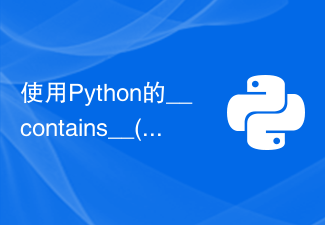This time I will bring you the relationship between ES6's "class" and object-oriented. What are the notes on the relationship between ES6's "class" and object-oriented. The following is the actual combat. Let’s take a look at the case.
Last time we talked about the object-oriented nature of ES5 and the parasitic combined style inheritance that is recognized by everyone as the best. Times are progressing, and in ES6, the big boss of object-oriented has undergone a major change as a matter of course, from the original relatively long writing method to a "small and fresh" writing method. Let's take a look together.
In ES6, there is the concept of class, and it is established openly.
Let’s take a look at a string of code:
class Dad {
constructor(name="无姓名",age=0){
this.name=name;
this.age=age;
}
surface(){
console.log(this.name,this.age);
}
}
class Sons extends Dad {
constructor(name,age){
super(name,age);
}
}
const son1=new Sons("张花花",16);
son1.surface();In fact, we are still using the example mentioned last time. In ES6, we use extends to implement inheritance from the parent class, and at the same time construct The super method is called in the processor to implement the subclass to pass parameters to the parent class. Here we pass in the girl Zhang Huahua as a parameter, and the surface method of the parent class is successfully called. Note that the method defined here in the class is actually the method in the prototype of ConstructorDad.
When I say this, maybe my friends will be a little shocked, exo me? Isn’t Dad a class? Why did it change the method? Let’s test it in the console:

# Wow! How terrifying, it is really just a function. In fact, the concept of class in ES6 is just a packaging of related concepts in ES5. To put it nicely, it is an abstraction of syntactic sugar, but it does seem simpler. For the above example, we inherited the surface method of the parent class, or we can write a method ourselves to override it.
This time we wrote another surface method in the subclass, successfully overriding the method of the same name inherited from the parent class.
I believe you have mastered the methods after reading these cases. For more exciting information, please pay attention to other related articles on the php Chinese website!
Related reading:
How vue configures keyboard events globally
Why put the css file in the head
Summary of the box model in HTML
What is the importance of overflow scrolling
The above is the detailed content of The relationship between ES6 'classes” and object-oriented. For more information, please follow other related articles on the PHP Chinese website!
 源码探秘:Python 中对象是如何被调用的?May 11, 2023 am 11:46 AM
源码探秘:Python 中对象是如何被调用的?May 11, 2023 am 11:46 AM楔子我们知道对象被创建,主要有两种方式,一种是通过Python/CAPI,另一种是通过调用类型对象。对于内置类型的实例对象而言,这两种方式都是支持的,比如列表,我们即可以通过[]创建,也可以通过list(),前者是Python/CAPI,后者是调用类型对象。但对于自定义类的实例对象而言,我们只能通过调用类型对象的方式来创建。而一个对象如果可以被调用,那么这个对象就是callable,否则就不是callable。而决定一个对象是不是callable,就取决于其对应的类型对象中是否定义了某个方法。如
 使用Python的__contains__()函数定义对象的包含操作Aug 22, 2023 pm 04:23 PM
使用Python的__contains__()函数定义对象的包含操作Aug 22, 2023 pm 04:23 PM使用Python的__contains__()函数定义对象的包含操作Python是一种简洁而强大的编程语言,提供了许多强大的功能来处理各种类型的数据。其中之一是通过定义__contains__()函数来实现对象的包含操作。本文将介绍如何使用__contains__()函数来定义对象的包含操作,并且给出一些示例代码。__contains__()函数是Pytho
 使用Python的__le__()函数定义两个对象的小于等于比较Aug 21, 2023 pm 09:29 PM
使用Python的__le__()函数定义两个对象的小于等于比较Aug 21, 2023 pm 09:29 PM标题:使用Python的__le__()函数定义两个对象的小于等于比较在Python中,我们可以通过使用特殊方法来定义对象之间的比较操作。其中之一就是__le__()函数,它用于定义小于等于比较。__le__()函数是Python中的一个魔法方法,并且是一种用于实现“小于等于”操作的特殊函数。当我们使用小于等于运算符(<=)比较两个对象时,Python
 详解Javascript对象的5种循环遍历方法Aug 04, 2022 pm 05:28 PM
详解Javascript对象的5种循环遍历方法Aug 04, 2022 pm 05:28 PMJavascript对象如何循环遍历?下面本篇文章给大家详细介绍5种JS对象遍历方法,并浅显对比一下这5种方法,希望对大家有所帮助!
 Python中如何使用getattr()函数获取对象的属性值Aug 22, 2023 pm 03:00 PM
Python中如何使用getattr()函数获取对象的属性值Aug 22, 2023 pm 03:00 PMPython中如何使用getattr()函数获取对象的属性值在Python编程中,我们经常会遇到需要获取对象属性值的情况。Python提供了一个内置函数getattr()来帮助我们实现这个目标。getattr()函数允许我们通过传递对象和属性名称作为参数来获取该对象的属性值。本文将详细介绍getattr()函数的用法,并提供实际的代码示例,以便更好地理解。g
 探讨安卓系统与Linux内核之间的关系Mar 14, 2024 pm 12:48 PM
探讨安卓系统与Linux内核之间的关系Mar 14, 2024 pm 12:48 PM安卓系统与Linux内核是息息相关的两个实体,它们之间的关系紧密而又复杂。在安卓系统中,Linux内核充当着重要的角色,为安卓系统提供了底层的硬件驱动和系统调用支持。本文将探讨安卓系统与Linux内核之间的关系,以及它们是如何交互、协同工作的,同时提供一些具体的代码示例。安卓系统是基于Linux内核开发的移动操作系统,主要用于智能手机、平板电脑等移动设备。L
 使用Python的isinstance()函数判断对象是否属于某个类Aug 22, 2023 am 11:52 AM
使用Python的isinstance()函数判断对象是否属于某个类Aug 22, 2023 am 11:52 AM使用Python的isinstance()函数判断对象是否属于某个类在Python中,我们经常需要判断一个对象是否属于某个特定的类。为了方便地进行类别判断,Python提供了一个内置函数isinstance()。本文将介绍isinstance()函数的用法,并提供代码示例。isinstance()函数可以判断一个对象是否属于指定的类或类的派生类。它的语法如下
 华为鸿蒙系统与安卓的关系研究Mar 23, 2024 am 11:54 AM
华为鸿蒙系统与安卓的关系研究Mar 23, 2024 am 11:54 AM华为鸿蒙系统与安卓的关系研究随着科技的不断发展,智能手机已经成为人们生活中不可或缺的一部分。而作为全球领先的手机制造商之一,华为一直在不断创新,致力于提供更好的手机操作系统和用户体验。近年来,随着美国对华为的打压,华为开始加速研发自主操作系统,于是鸿蒙系统(HarmonyOS)应运而生。在此背景下,人们开始关注起了鸿蒙系统与安卓之间的关系。首先,我们需要了解


Hot AI Tools

Undresser.AI Undress
AI-powered app for creating realistic nude photos

AI Clothes Remover
Online AI tool for removing clothes from photos.

Undress AI Tool
Undress images for free

Clothoff.io
AI clothes remover

AI Hentai Generator
Generate AI Hentai for free.

Hot Article

Hot Tools

EditPlus Chinese cracked version
Small size, syntax highlighting, does not support code prompt function

SublimeText3 English version
Recommended: Win version, supports code prompts!

MinGW - Minimalist GNU for Windows
This project is in the process of being migrated to osdn.net/projects/mingw, you can continue to follow us there. MinGW: A native Windows port of the GNU Compiler Collection (GCC), freely distributable import libraries and header files for building native Windows applications; includes extensions to the MSVC runtime to support C99 functionality. All MinGW software can run on 64-bit Windows platforms.

SublimeText3 Linux new version
SublimeText3 Linux latest version

SAP NetWeaver Server Adapter for Eclipse
Integrate Eclipse with SAP NetWeaver application server.







